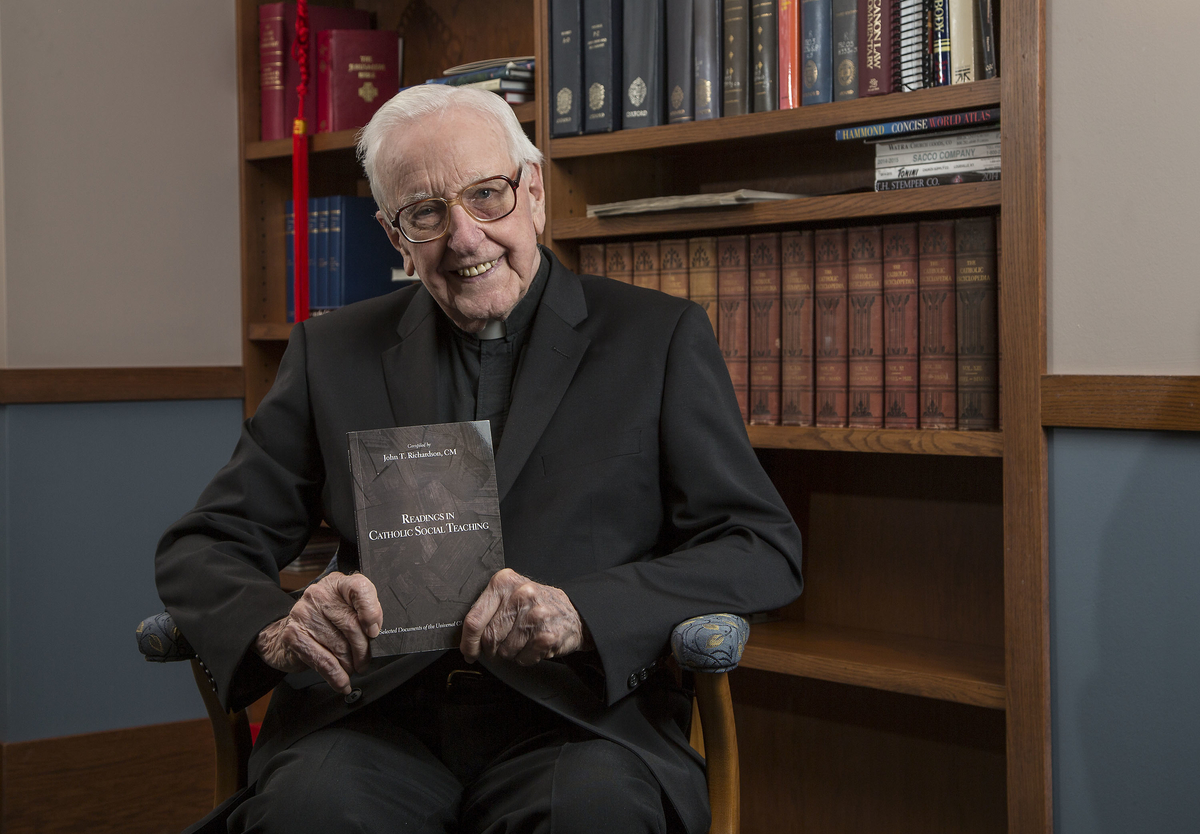 Fr. John T. Richardson, C.M., holds his newest book "Readings in Catholic Social Teaching." Richardson gathered the contents for the text book while he was living in Kenya teaching seminarians from 1997-2010 and it was recently published in February 2015. (Photo by Jamie Moncrief)
Fr. John T. Richardson, C.M., holds his newest book "Readings in Catholic Social Teaching." Richardson gathered the contents for the text book while he was living in Kenya teaching seminarians from 1997-2010 and it was recently published in February 2015. (Photo by Jamie Moncrief)In 1997, the Rev. John T. Richardson, C.M., had already been at DePaul for 43 years and had worn many hats around the university, including: professor, president and chancellor. The adventurous spirit in him was searching for a new chapter though. Inspired by stories from his brother and fellow Vincentians about their work in Africa, he volunteered to teach as part of the Vincentian mission in Kenya.
In Nyeri, Kenya, Fr. Richardson taught seminarians courses at Christ the King Seminary ranging from English composition and anthropology to sociology and comparative religion. At his peak, he was teaching seven of the eight courses offered in the seminary. In many cases though, Richardson had no textbook to base his courses on so he spent much of his time and energy creating his own. That is where his newest book, "Readings in Catholic Social Teaching" was born.
The book was created for his course that covered universal Catholic social teaching. He compiled a summary of papal teachings presented in encyclicals dating from the 1891 "Rerum Novarum" of Pope Leo XIII to the early 21st century, and supplemented them with a number of official documents from the Second Vatican Council of 1962-1965. In Kenya, the textbooks Fr. Richardson created with his laptop and printer were copied and bound by local shops. When he came back to the U.S. in 2010, friends encouraged him to print it, and the book was formally published in paperback this February.
Why did you decide to release this textbook at this point in your career?
I had already pulled all the materials together when I was teaching over in Kenya. I prefer teaching with textbooks and the students didn't have any, so I made my own. When I got back, I was telling people about it and it was suggested that I create an index and have it printed. The work was already done and I had some great people from DePaul to help me pull the index together.
As I started pulling my own ideas together for the textbook, I found that most of the materials I was using were all very well written. There was no reason for me to rewrite it. It is more authentic that way, to teach it as it was originally written.
Do you have a favorite chapter that you enjoyed putting together for the textbook?
Not particularly. There are a lot of good ones. Theoretically though, the most important part is the first chapter. It's about the human person and what the human person is. This is the basis for Catholic social teaching.
The background is theological and philosophical. It is theological in that the human person reaches a high dignity because of the incarnation when the second person of the trinity became the human person. Through Christ's incarnation as a human person he unites himself with all other human persons. It is something very special. The philosophical background is basic human dignity. All of society - political, social, behavioral - is centered on the human person. The principle of dignity gives substance to the relationships. These teachings come from the reading "Caritate in Veritate."
What do you want people to take away from the book?
I want people to take away the importance of social living. The people we are living with are extremely important. Whatever type of engagement you encounter with that person - career, business, personal - you cannot leave out the human person. I found that out through practice in my career in university teaching and administration.